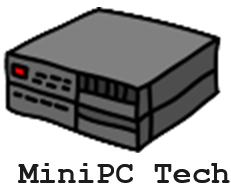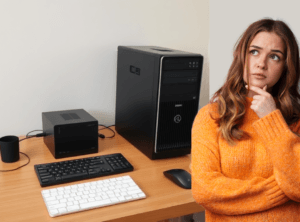Mini PC vs Desktop PC, how to you choose? It can feel like solving a tech puzzle, but it all starts with understanding your options. Mini PCs, these little powerhouses, have grabbed a lot of attention lately. Despite their small size, they pack quite a punch! In contrast, Desktop PCs are like the reliable workhorses we all know. Bigger, heavier, but traditionally known for getting the heavy-duty jobs done without breaking a sweat.
Now, why all the buzz around Mini PCs? Well, compactness and efficiency are at the top of the list. Mini PCs have made quite an entrance, especially in settings where space-saving is key. Gone are the days when you’d need an entire desk for your computer setup. These little devices can tuck away neatly just about anywhere. Electrifyingly exciting for those who love a clutter-free workspace.
But how do they stack up against the traditional Desktop PC in terms of power and function? While Desktop PCs have been the go-to for hardcore gaming, intensive tasks, and multi-media editing, Mini PCs are steadily catching up. With advancing technology, some Mini PCs now sport specs that, not so long ago, were reserved for their larger cousins.
Knowing these basics sets the stage for making an informed decision when choosing between these two contenders. Each has its perks and pitfalls, and understanding what they offer marks your first step toward finding the perfect match for your needs. This will come down to what you need, be it portability or raw power, and what role the PC will play in your daily life.
Performance Comparison: Mini PC vs Desktop PC
The heart of any computer showdown lies in performance. So, are mini PCs as good as desktops when it comes to raw horsepower? Desktop PCs have traditionally been known as the muscle cars of the computer world, ready to turbo-charge your gaming or intensive workloads without breaking a sweat. But mini PCs, with their smaller footprint, are stepping up their game substantially with some impressive processors and modern tech packed inside.
Graphics performance is another battlefield. Hardcore gamers might still lean toward desktops, thanks to their capacity to house beefy graphics cards. However, many mini PCs now offer more than decent graphics capabilities, though perhaps not at the extreme end of the gaming spectrum. For streaming, light gaming, and media consumption, they’re showing commendable performance.
Cooling is a hot topic, quite literally. Desktop PCs typically have ample space for large fans or even liquid cooling systems, making them better at staying chill during heavy tasks. Mini PCs, due to their petite design, often rely on more compact cooling solutions which might not handle prolonged, intense sessions as efficiently.
When it comes to upgrades and flexibility, desktops often have the upper hand. You can easily swap out components, add memory, or upgrade storage at will. Meanwhile, mini PCs usually aren’t as accommodating, so what you buy initially might be as far as you go, hardware-wise. This lack of flexibility can be a drawback for those who love to tweak and tinker.
Ultimately, understanding the nuances of performance in each device is key. Desktops still rule the roost in terms of ultimate power and customization, but mini PCs are no slouch, excelling in efficiency and usability for everyday tasks. The choice largely depends on what you need from your machine and how far you’re willing to compromise on size for performance.
Pros and Cons: Which Should You Choose?
Choosing between a Mini PC and a Desktop PC isn’t just about specs; it’s about your lifestyle. So, is a mini PC worth buying for your particular needs? For the minimalist who values compactness and efficiency, the mini PC could be the answer. These little units are a godsend in tight spaces, making them ideal for dorm rooms, small apartments, or office environments where space is at a premium.
On the flip side, let’s talk about the cons. The chief disadvantage of a mini computer is its limited ability in terms of upgrades. If you’re someone who enjoys the flexibility of swapping out parts and future-proofing your setup, you might find this a bit constricting. Performance limits could also be a concern if you attempt to push these machines beyond their intended use.
But that’s not to say mini PCs don’t have their audience. They are fantastic for everyday computing tasks like web browsing, streaming, and handling documents. Plus, they sip electricity compared to their larger, more power-hungry counterparts, helping slash those utility bills in the long run.
Desktop PCs still stand strong for those who need more from their machine – be it gaming, video editing, or running high-end software that demands serious computing power. They offer a playground of possibilities with easy upgrade paths and customization options that can transform your PC into something uniquely yours.
Trying to match the right device with your needs is key. A Mini PC could be perfect if your computing tasks are basic and you prefer something sleek and easy to manage. For more demanding applications or if personalization is your jam, the trusty desktop is hard to beat.
Mini PCs for Everyday Use: A Practical Choice?
Mini PCs have earned their stripes as a smart choice for everyday use scenarios. These compact computers handle daily tasks with ease, from browsing the web and streaming videos to word processing and more basic office duties. Unlike their bulky counterparts, they fit snugly on or under a desk or even behind a monitor, which is a major win for tight spaces.
But are mini PCs good for everyday use? Absolutely, if your needs align with their capabilities. They offer a simple plug-and-play experience, often without the need for extensive setup. Whether for a home office or a family room media center, their unobtrusiveness and low power consumption make them an attractive option.
There are even small solutions that are technically mini pcs like the Raspberry Pi that you can configure as a desktop.
That said, if you expect to perform hardware-intensive tasks or seek extreme performance, a mini PC might not be the ideal fit. They are designed for efficiency rather than raw power, so pushing them to their limits might not yield the best results. This is something to consider if your everyday use includes more demanding computing tasks.
Convenience and a clutter-free environment are often understated benefits. Mini PCs minimize cables and use less electricity, translating into tangible savings and tidier spaces. Plus, as technology continues to evolve, mini PCs are expected to deliver even more while keeping their small footprint.
At the end of the day, whether a mini PC is your best choice boils down to how you plan to use your computer. Take a close look at your needs, budget, and space constraints, and make an informed decision that fits your lifestyle.

I am a retired software engineer with experience in a multitude of areas including managing AWS and VMWare development environments. I bought a relative a mini-PC a year ago and have become passionate about the technology and its potential to change how we deploy software.

